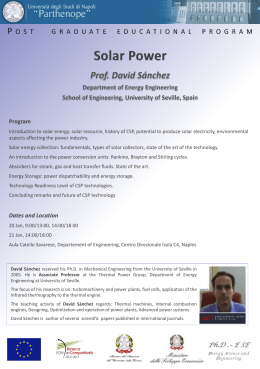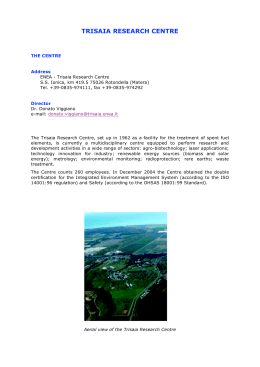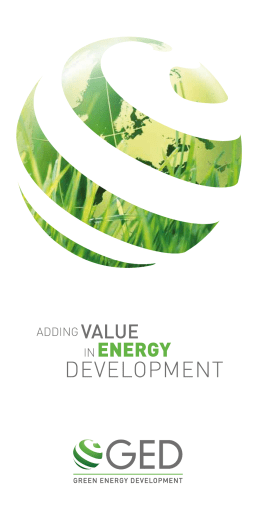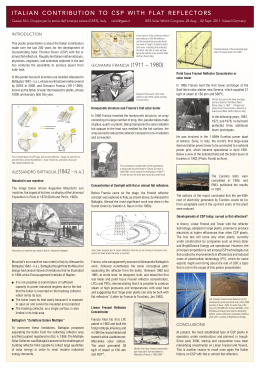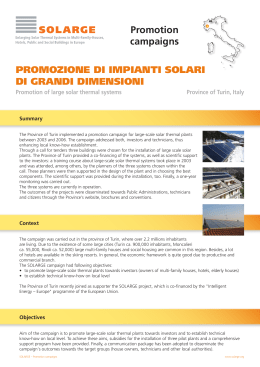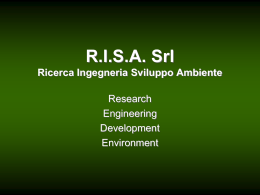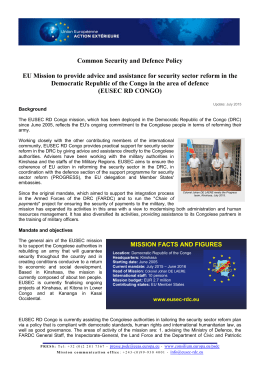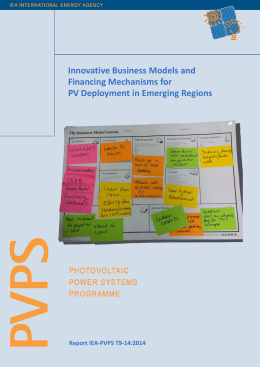The Report Green Energy for Africa Forward About ForGreen ForGreen Spa, led by Germano Zanini, is a company with the objective to supply green energy and develop new models, projects and services in the renewable energy sector. ForGreen defines itself as a green generation company, a group of people enthusiastic about renewable energies and sustainable business. Our sustainability model Since the beginning, ForGreen believes in the green economy and promotes the use of green energy (as the photovoltaic one) to the detriment of fossil fuels. ForGreen is committed to the idea that sustainable behaviours are the roadmap for the companies of the future. Therefore all the activities promoted by ForGreen aim at reducing levels of CO2 and diffusing a green awareness so to foster a sustainable economic development. People of DR Congo have known an history of extreme violence and poverty, which prevented the development of basic infrastructures and regular education of the local youth. In 2011, ForGreen decided to contribute to the growth of the country with the project Green Energy for Africa. Why? As many parts of the world, Italy has suffered from poverty and backwardness, especially in the aftermaths of WWI. In 1923, some families in the rural area of Valpantena and Lessinia around Verona decided to create a common project to help the economic and social growth of the territory: they created an hydroelectric plant called La Lucense. This experience has inspired ForGreen’s engagement in the field of the green economy. Since then, ForGreen has developed the expertise and innovative solutions to foster the economic and social benefits of the local population. Now ForGreen is ready to make available its know-how to other parts of the world still lacking of modern access to electricity and common facilities. Monitoring energy consumption and production This is the reason why ForGreen decided to realize the project in the DR Congo. Energy saving and efficiency The Combonian mission present in the rural area near Kinshasa acted as a mediator between us and the needs of the local population. The leader of the mission Don Eliseo expressed the urgency of building a school provided with access to internet and electricity, to create an educational centre for the young community. We decided to help making available our expertise in the field of the green energy. In particular, due to the environmental condition of the area, we believed that the best solution for the supply of clean energy was the photovoltaic system, integrated with an energy storage system. The long-term efficiency of the project could have been ensured thanks to a constant maintenance work of the installed system. Therefore, training local people to maintain the plant was fundamental for the success of the project. Green energy production Sustainable and conscious consumption Green marketing and communication Promotion of a sustainable culture Contacts Authors of the Report: Valentina Beghini - Federica Poletti Contact email: [email protected] - [email protected] Main donor: ForGreen Spa Implementing actor name: ForGreen Spa Telephone: +39 045 8762600 Links www.forgreen.it www.congoskill.com Photo credits Congo Skill, École Professionnelle Renzo Veronesi I am really proud of this initiative, since our expertise helped Congo’s young people to develop their own powers: their natural energy (the solar power) and their skills, improved by the educational activities of the school. Moreover, the project represented an opportunity of growth for ForGreen itself, which is now experimenting new solutions and technologies for the development of sustainable living models. In 2010 ForGreen participated to the Shanghai’s Expo with a sustainable model of smart city, then realized in the photovoltaic plant near Padova (Telezip). The project in Congo helped us to make a step forward from the concept of smart city to a new concept of smart farm village, a model of independent and sustainable community developed through the use of clean energy. This is the model that ForGreen aims to present at Expo Milan 2015 and we would like to welcome the opportunity represented by the Universal Exposition to find new partners and investors to realize other projects as Green Energy for Africa and develop new smart farm villages. Our dream is to keep on innovating our models and develop creative sustainable solutions: it would be ideal to arrive at Expo Dubai 2020 with a new model of smart people, able to foster the consciousness about the resources of the planet in single individuals and help them realize sustainable practices. Germano Zanini President ForGreen Spa Green Energy for Africa: the project Abstract The project Green Energy for Africa was born to provide the school in Kinshasa, DR Congo with access to electricity. The project demonstrated how solar power, with the support of innovative and sustainable technologies, can supply modern access to electricity for the activity of the school and the cooking facilities of the cyber café. Project Description The project Green Energy for Africa was realized in 2011 thanks to the partnership between the IT Professional School “Renzo Veronesi” (run by the “Congo Skill” program) and the company ForGreen Spa. The objectives of the project are: promoting the access to clean energy to foster the educational process and alphabetization of people living in the rural area; reducing the educational and cultural gap between urban and rural areas; creating a replicable model so to engage other cities in Africa in the process of alphabetization and education through renewable energy systems. The project demonstrated how the use of renewable energies and innovative technologies is a fundamental resource for the school and the local community. The technology employed consists in 18 stand-alone photovoltaic panels (4.14 kWp) and an energy storage system. The structure satisfies the energetic requirements of the social centre, allows students to take part to classes both in day and night time, use computers and access to internet. Furthermore, the system supplies energy to the cyber café, a social centre with cooking facilities and a restaurant activity available for students. The efficiency of the photovoltaic system can be safeguarded through a constant maintenance work. Therefore, an important part of the project consisted in training local people in maintaining the installed system, so to make them independent from external help for the energy supply. Lessons learnt The lesson consisted in understanding the installation of solar panels as a small step toward the full development of the local community. This experience helped us to imagine a broader concept of smart farm village, where solar energy needs to be coupled with other technologies and projects. Firstly, for the deployment of modern energy and cooking facilities there is the need to install a water pumping system. We imagined to develop this project through the installation of a micro- wind power technology. Secondly, for long term sustainability of the project there is the need to raise consciousness in local people about the potentiality of natural resources present in their environment. Key Features Beneficiaries The main beneficiaries are the students of the school “Renzo Veronesi”. Moreover, the school is provided with a cyber café which has become an important social and educational centre for the community, hence the benefits of the project are extended to the whole community. Results The direct result consists in the installation of 18 solar panels with a total power of 4.14 kWp and an annual production of 5423.40 kWh. The total consumption is 5610 kWh, the system supplies more than 80% of the energetic need required by the community and reduces the costs of management of the school. The indirect result consists in the development of local people’s skills for the maintenance of the installed system, growing the technological expertise of the whole community. The photovoltaic demonstrated to be the best solution to satisfy the energetic need of the local community and develop a strategy of growth of local people’s skills. The energy storage system and the photovoltaic installation allow to minimize the energetic costs of the structure and provide a continuous access to energy during day and night time. The project shows how a sustainable and responsible use of solar energy and innovative technologies can boost the lifestyle of local people and reduce inequalities. Business Model ForGreen’s business model consists in the realization of stand-alone solar system and energy storage kit for areas lacking electricity. The kit is designed to be replicable and adaptable to different environments. ForGreen is looking for investors for the model. The cost of this project was 17.000 €. Teaching the skills for the maintenance of the technological gear assures the active engagement of local people and the social sustainability of the project. The lifespan of the project is 15 years. The innovative aspect consists in providing a better access to education thanks to the use of clean energy. The project demonstrates how solar energy can improve the life of the community. The ownership of the project is safeguarded by teaching local people how to maintain solar panels, hence the whole community becomes independent from external help and can apply its knowledge for future projects. The project is easily replicable and scaled up by installing more solar panels in the village. Another characteristic of the project is the partnership created between the Combonian mission, who is present in the local community since 30 years, with the technological know-how of the company ForGreen. The partnership was fundamental for understanding the needs of the community, engaging actively local people in the project (thanks to the mediation of the Combonian mission) and keep the monitoring of the project thanks to constant communication between the two partners. Other significant information The project meets some of the Millennium Development Goals 2015 (MDG): it helps achieving universal primary education (MDG 1) and ensure environmental sustainability (MDG7) by promoting the access to green energy. The primary scope of the project is to improve the IT skills of the local youth through the activities run by the school, provide energy from renewable sources and make the structure of the school a point of reference for the whole rural community. Furthermore, the project permitted the creation of a cyber café, provided with a restaurant, canteen facilities and modern kitchen equipment. The project was realized with attention to energy efficiency and sustainable consumption. The project achieved indirect results as the social aggregation generated by the cyber café resulted to be a fundamental point of reference for the community. Finally, supplying energy to the school decreased educational inequality between the rural and urban area of DR Congo. Green Energy for Africa forgreen.it
Scaricare
